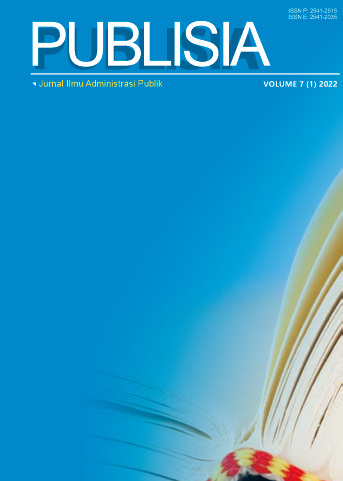Collaborative governance in CSR management program for slum area rehabilitation
DOI:
https://doi.org/10.26905/pjiap.v7i1.7480Keywords:
collaboration skills, slums area, CSRAbstract
This study aims to explain how the skills needed for successful collaboration between the government, the private sector, and the community are as a solution for social rehabilitation of slum settlements. The case chosen was a collaboration between PT Astra International, the sub-district government, and the people of the East Keputih Tegal Sub district, Surabaya City which is a CSR fund management program. This study uses a qualitative descriptive method using primary data collection techniques (interviews, observation and documentation). The theory used in this research is collaborative governance skills according to (Donahue & Zeckhauser, 2011). The results show that the success of Collaborative Governance that occurs between the Government, PT. ASTRA and the community can run optimally because they are able to collaborate in 4 types, namely, a) Collaboration for Productivity, b) Collaboration for Information; c) Collaboration for Legitimacy Collaborative governance; and d) Collaboration for Resources. From the 4 types of collaboration that the researcher analyzed, all collaboration skills that occur are in accordance with the 8 skills proposed by (Donahue & Zeckhauser, 2011). The success of this collaboration is because the sub-district government is able to delegate several functions to PT ASTRA and the community. In addition, community participation can be facilitated from the beginning of the program to implementation. PT ASTRA is very professional in carrying out the delegation function given by the sub-district government and the Surabaya City Government.Downloads
References
Agranoff, R., & McGuire, M. (2003). Collaborative public management: New strategies for local governments. Georgetown University Press.
Ansell, C., & Gash, A. (2008). Collaborative governance in theory and practice. Journal of Public Administration Research and Theory, 18(4), 543–571.
Donahue, J. D., & Zeckhauser, R. J. (2011). Collaborative governance. Princeton University Press.
Emerson, K., & Nabatchi, T. (2015). Collaborative governance regimes. Georgetown University Press.
Furqoni, I., Rosyadi, S., & Isna, A. (2019). Collaborative governance in corporate social responsibility forum in Banyumas Regency. Jurnal Bina Praja: Journal of Home Affairs Governance, 11(2), 209–217.
Hede Skagerlind, H., Westman, M. O. A., & Berglund, H. (2015). Corporate Social Responsibility through Crossâ€sector Partnerships: Implications for Civil Society, the State, and the Corporate Sector in I ndia. Business and Society Review, 120(2), 245–275.
Jayaraman, A., D’souza, V., & Ghoshal, T. (2018). NGO–business collaboration following the Indian CSR Bill 2013: Trust-building collaborative social sector partnerships. Development in Practice, 28(6), 831–841.
KsiężaK, P. (2016). The Benefits from CSR for a Company and Society. Journal of Corporate Responsibility and Leadership, 3(4), 53–65.
Miles, M. B., Huberman, A. M., & Saldaña, J. (2018). Qualitative data analysis: A methods sourcebook. Sage publications.
Poret, S. (2014). Corporate-NGO partnerships in CSR activities: why and how?
Putri, M. R., & Rodiyah, I. (2016). Kemitraan pemerintah-swasta dalam program corporate social responsibility di Kabupaten Pasuruan. JKMP (Jurnal Kebijakan Dan Manajemen Publik), 4(2), 117–134.
Scott, T. A., & Thomas, C. W. (2017). Unpacking the collaborative toolbox: Why and when do public managers choose collaborative governance strategies? Policy Studies Journal, 45(1), 191–214.
Vaid, U., & Evans, G. W. (2017). Housing Quality and Health: An Evaluation of Slum Rehabilitation in India. Environment and Behavior, 49(7), 771–790. https://doi.org/10.1177/0013916516667975
Vilar, K., & Cartes, I. (2016). Urban Design and Social Capital in Slums. Case Study: Moravia’s Neighborhood, Medellin, 2004-2014. Procedia - Social and Behavioral Sciences, 216, 56–67. https://doi.org/10.1016/j.sbspro.2015.12.008
Downloads
Published
How to Cite
Issue
Section
License
Authors who publish with this journal agree to the following terms:
- Copyright of the published articles will be transferred to the journal as the publisher of the manuscripts. Therefore, the author confirms that the copyright has been managed by the journal.
- Publisher of Publisia: Jurnal Ilmu Administrasi Publik University of Merdeka Malang.
- The copyright follows Creative Commons Attribution and share a like License (CC BY SA): This license allows to Share and copy and redistribute the material in any medium or format, Adaptative remix, transform, and build upon the material, for any purpose, even commercially.







